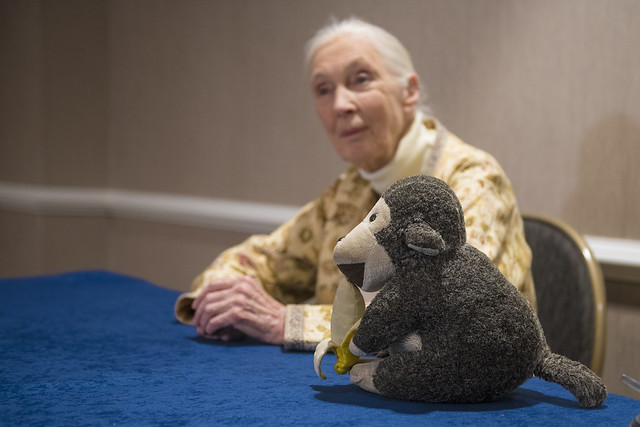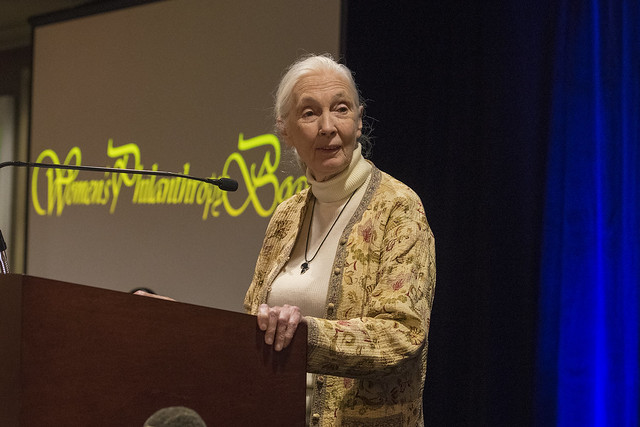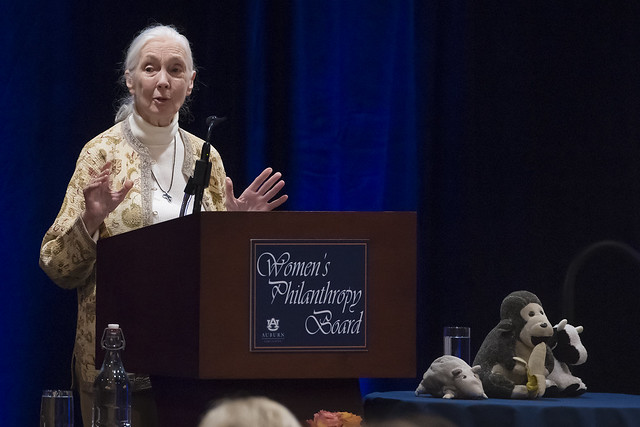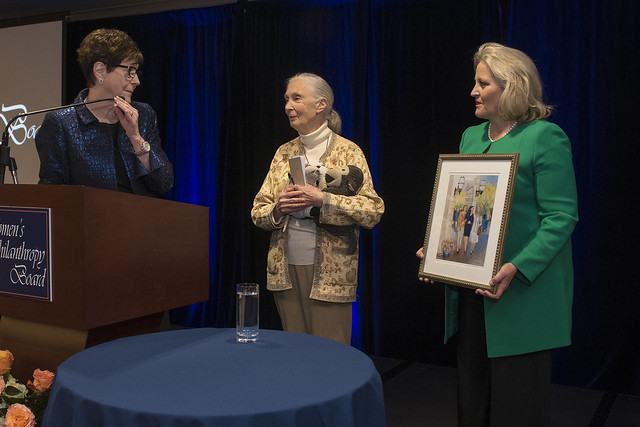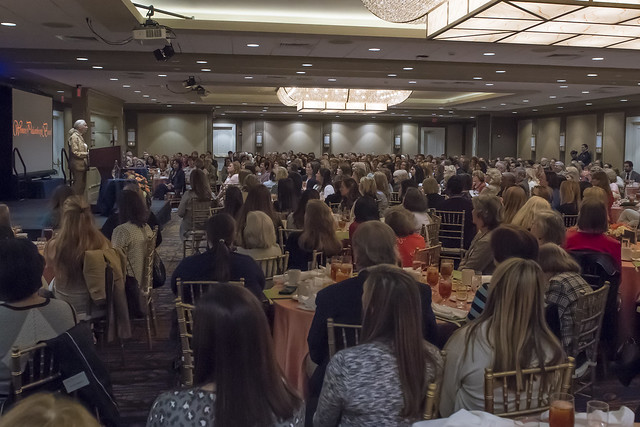Goodall enchants Women’s Philanthropy Board event with tales of her remarkable career
Article body
Jane Goodall had never been to Auburn or Auburn University before Monday and yet the famed primatologist and anthropologist knew the power of change resided on the Plains.
"It takes one person who thinks it's a great idea, who gets his or her friends together and talks about what they can do to make the world a better place, roll ups the sleeves and gets out and does it," she said. "It's very simple."
In 1960, a then-26-year-old Goodall took that same basic principle into the rainforests of Tanzania and fulfilled a childhood dream of working with animals and living in Africa. Her landmark study of chimpanzees — primarily discovering that they make and use tools — made her a household name.
It's a name she still uses today to provoke change for humans, animals and the environment through the Jane Goodall Institute and Roots and Shoots, a program aimed at empowering young people to make the world a better place.
Her stop in Auburn was part of her American lecture tour. The now 84-year-old spends 300 days a year traveling the world with a message of change.
June Henton, dean of Auburn's College of Human Sciences, said Goodall "exemplifies the difference one woman can make."
Before delivering the keynote address of the Women's Philanthropy Board Spring Symposium and Luncheon, Goodall told members of the media she was hopeful there would be at least one student at Auburn who could start a Roots and Shoots program here. She started the program in 1991 with 12 high school students in Africa. It now boasts 150,000 groups in 100 countries. Members are from pre-school through university-age.
"I realized as I was traveling around the world raising awareness and money that so many young people didn't have much hope for the future," she said. "They were angry, depressed or just apathetic. And I felt that if our young people lose hope then we might as well all give up because they're the stewards of the planet."
Goodall said Roots and Shoots is unlike any other program, as it was founded with a simple message: "each one of us makes a difference every day." It comes down to choice. The students in the program choose to make the world better by helping people, animals and the environment.
"Every single one of us can make an impact," she said. "We have a choice every day."
Goodall called upon the students in the luncheon to find their passion to make a difference in the world. She said she was born with a love of animals that was fully supported by her mother. When a toddler Jane brought earthworms into her bed, she said her mother didn't scold her, but rather told her they needed to go back outside in order to live.
"When I was 10, when I dreamed of going to Africa, everybody laughed at me," she recalled. "This was in 1944 and women didn't do that sort of thing. My mother always said if you want to do something then you're going to have to work hard, take advantage of opportunity and don't give up."
Goodall found additional supporters, heroes even, in books. There was Dr. Dolittle and then Tarzan. She said she too talked to the animals like Dolittle. A 10-year-old Jane saved her pennies during World War II to buy "Tarzan of the Apes" from a secondhand bookstore. She read it cover to cover, over and over. She still possesses the book today.
"What did Tarzan do?" she asked the luncheon attendees, the Women's Philanthropy Board's largest crowd in 16 years.
"He married the wrong Jane" — a response that earned boisterous laughter.
She may have been jealous of that fictional Jane, but it was short lived. Goodall had nothing to be jealous of as her work in Africa, which lasted much longer than she ever expected, drew international attention to the plight of animals and the rainforest itself.
The woman with her white hair pulled back in a ponytail that National Geographic portrayed sitting on the rainforest floor among the chimpanzees would famously talk to the animals.
Goodall recalled the time she communicated with David Graybeard, the first chimp to lose his fear of her. She offered him a nut, but he turned his face away. She moved her hand closer to him and "he looked directly into my eyes, took the nut, dropped it and then very gently squeezed my fingers, which is how chimps reassure each other.
"I knew in that moment we were communicating."
She said she thought her work would last maybe three years. Louis Leakey, the archeologist and anthropologist who raised funds to support Goodall's initial research in 1960, thought Goodall would last 10 years in Africa with the animals.
"I didn't think beyond that," said Goodall of the start of a 55-year career. "I lived in the moment."
Related Media
Media interested in this story can contact Communications Director Preston Sparks at (334) 844-9999 or preston.sparks@auburn.edu.
Auburn University is a nationally ranked land grant institution recognized for its commitment to world-class scholarship, interdisciplinary research with an elite, top-tier Carnegie R1 classification, life-changing outreach with Carnegie’s Community Engagement designation and an undergraduate education experience second to none. Auburn is home to more than 30,000 students, and its faculty and research partners collaborate to develop and deliver meaningful scholarship, science and technology-based advancements that meet pressing regional, national and global needs. Auburn’s commitment to active student engagement, professional success and public/private partnership drives a growing reputation for outreach and extension that delivers broad economic, health and societal impact.



